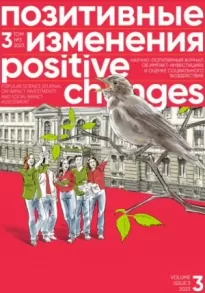Позитивные изменения. Том 3, № 3 (2023). Positive changes. Volume 3, Issue 3 (2023)

- Автор: Редакция журнала «Позитивные изменения»
- Жанр: Научная литература / Газеты и журналы
- Дата выхода: 2023
Читать книгу "Позитивные изменения. Том 3, № 3 (2023). Positive changes. Volume 3, Issue 3 (2023)"
RECOMMENDATIONS FOR SOCIAL INNOVATION DEVELOPMENT
The features of social innovation development models listed above have enabled the researchers to outline a series of recommendations for enhancing social innovation within universities. These recommendations follow a hierarchical approach, from those that require minimal resource allocation, including organizational adjustments, to those that demand extensive transformation of the university’s operations.
1. Diversifying Implementation Formats for Advancing Social Innovation, Maintaining Their Systemic Interaction
• Establishing social innovation incubators with the goal of supporting social entrepreneurs and student startups.
• Creating a “hub” for social innovation development that facilitates interaction among all sectors, including businesses, NGOs, and government agencies, to facilitate the transfer of information, knowledge, and technologies.
• Ultimately, creating an environment for the “innovators’ journey through the realm of social innovation.” Importantly, innovators here are not just students and university staff, but also the broader local community. Many social innovation development centers aspire to enable anyone within the university’s sphere of influence, regardless of their formal affiliation with the institution, to bring forth their innovative ideas and receive support for their implementation, similar to the approach adopted by Vanderbilt University.
2. Territorial Development and Active Engagement of the Local Community
• Implementing the functions of a volunteer hub, providing students with opportunities to participate in NGO projects.
• Engaging local community members and NGOs, offering mentoring, expertise, hackathons, competitions, and practical case studies.
• Making university resources available to innovators from NGOs and the local community, including access to laboratories and equipment.
• Establishing networks of regional social enterprises.
• Developing and implementing social impact programs tailored to address the specific issues facing local territories.
3. Interdisciplinary and Transdisciplinary Methodology
• Fostering collaboration between academic and educational departments within the realm of social innovation development.
• Prioritizing interdisciplinary educational programs that focus on the design and implementation of social innovations.
• Incorporating “social service” spin programs into students’ academic journeys, including leadership development initiatives (an example being the University of Manchester’s Stellify program).
4. Transformation of Educational and Research Activities
• Expanding the offer of entrepreneurship and social entrepreneurship courses as foundational components of the curriculum.
• Introducing disciplines related to social project management, covering aspects such as sustainable development, social impact assessment, climate change, and more.
These courses aim to cultivate critical thinking skills among students as they explore social issues and engage in discussions of concepts such as social and solidarity economies, self-governance, and sustainable social and economic development.
• Developing supplementary educational modules to enhance professional development in the field of social innovation.
5. Open Source
• Promoting unobstructed sharing of experiences and establishing libraries of best practices in the field of social innovation.
• Creating a digital network designed to identify, showcase, and facilitate collaboration among community-driven social impact projects. These projects will collaborate not only amongst themselves but also with universities worldwide, fostering research, education, and student engagement.
6. Networking
• International Competitions: Engaging in existing competitions in the realm of social innovation development offered by universities abroad (e.g., Map the System competition by the University of Oxford).
• Participating in global networks of young innovators and establishing their own networks (an example being the Yenching Academy of Peking University). Established in 2016, this forum operates as a global young innovators network, guided by leaders from both the public and private sectors. Its mission is to facilitate cooperation, cross-cultural understanding, and innovative learning to address and share solutions for some of the most pressing social challenges facing China and the world.
• Regional, national, federal and international cooperation. As evident from the networking examples presented in this study, given the previously noted characteristic of universities’ “open-source” approach to social innovation, existing alliances, consortia, networks, and forums offer substantial opportunities for participation. Additionally, drawing from Sweden and the Malmö University Forum as an example, the notion of establishing a national network for innovation and social entrepreneurship is also a viable option.
It is crucial to highlight key attributes of this forum, which may serve as the foundation for introducing a similar framework in other countries:
• The Forum gathers and disseminates both national and international data pertaining to social innovation development, while spearheading research and development initiatives.
• It vigilantly tracks events and news in the field of innovation development at national and international levels. Furthermore, it promotes the growth, exchange, and application of knowledge and expertise.
• It encourages representatives from the academic, private, public, and non-governmental sectors to participate.
• The Forum maintains a nationwide presence.
• It seeks to build capacity for innovation and ideas that address social challenges through collaboration with stakeholders from academia, private industry, government, and non-profit organizations. Additionally, the Forum aims to bring together new groups of partners from academia, business, nonprofits, and government agencies that support the advancement of social innovation.
• Its ultimate objective is to leverage the resources, knowledge, and funds available to the participants to serve the local community in an innovative, efficient, and sustainable manner.





